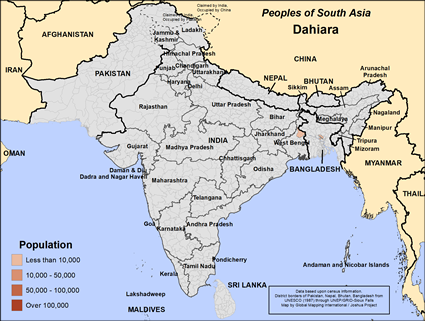Dahiara in India

Send Joshua Project a photo
of this people group. |

Map Source:
People Group data: Omid. Map geography: UNESCO / GMI. Map Design: Joshua Project
|
| People Name: | Dahiara |
| Country: | India |
| 10/40 Window: | Yes |
| Population: | 2,700 |
| World Population: | 2,700 |
| Primary Language: | Bengali |
| Primary Religion: | Islam |
| Christian Adherents: | 0.00 % |
| Evangelicals: | 0.00 % |
| Scripture: | Complete Bible |
| Ministry Resources: | Yes |
| Jesus Film: | Yes |
| Audio Recordings: | Yes |
| People Cluster: | South Asia Muslim - other |
| Affinity Bloc: | South Asian Peoples |
| Progress Level: |
|
Introduction / History
The Muslim Dahiara people have a long history in India, particularly in the northern regions. Traditionally, they have been involved in agriculture and small-scale trade. The Dahiara people primarily speak Bengali and live in West Bengal.
What Are Their Lives Like?
Today, the Muslim Dahiara people live in rural and semi-urban areas, engaging in farming, trading and various crafts. They cultivate crops such as wheat, rice, and vegetables and many families also run small businesses. Their communities are close-knit, emphasizing strong family bonds and mutual support.
The Muslim Dahiara people distinguish themselves from other groups through their blend of agricultural expertise and trading skills. Their deep knowledge of farming techniques and commerce sets them apart from neighboring communities.
The Dahiara's eating practices involve both vegetarian and non-vegetarian food, featuring rice, lentils, vegetables and meat. They enjoy traditional dishes such as biryani and kebabs during festive occasions. Their culinary practices emphasize the use of spices and locally available ingredients.
Their wedding practices are elaborate and deeply rooted in Muslim traditions. Weddings typically include rituals such as the Nikah (marriage contract), exchange of gifts, and vibrant celebrations with music and dance.
What Are Their Beliefs?
The Muslim Dahiara people practice Sunni Islam. They observe Islamic rituals, including the five daily prayers, fasting during Ramadan, and celebrating religious festivals such as Eid al-Fitr and Eid al-Adha. Their belief system emphasizes values like community service, hospitality, and respect for elders. They also honor their ancestors through prayers and gatherings, ensuring the transmission of their religious and cultural traditions across generations.
What Are Their Needs?
The Muslim Dahiara people need better access to quality education to provide more opportunities for their children. Improved healthcare services are essential due to limited availability of medical facilities and high rates of preventable diseases. Economic support through modern agricultural techniques, market access, and vocational training can enhance their livelihoods. Infrastructure development, including better roads, clean water supplies, and reliable electricity, will greatly benefit the Dahiara community. Addressing these needs will help the Dahiara people achieve greater socio-economic stability while preserving their rich cultural and religious heritage.
Prayer Points
Ask the Holy Spirit to open their eyes, hearts and ears to the good news of the savior.
Ask for many to embrace Jesus Christ no matter what the social cost.
Pray for the Lord to raise up the right people to disciple the Dahiara in his ways.
Pray for the Lord to demonstrate his power and goodness among them in a way they will understand.